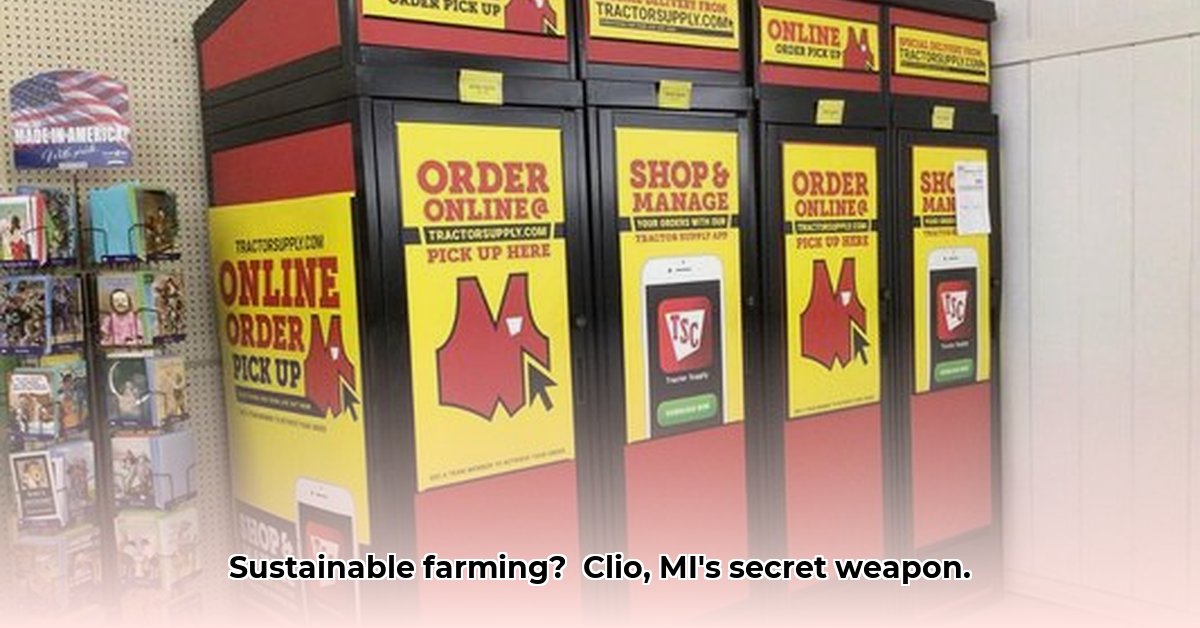
Your Local Resource for Sustainable Agriculture
Tractor Supply Company (TSC) in Clio, Michigan, offers a valuable resource for local farmers and gardeners seeking sustainable agricultural practices. While known for its wide range of products, the store's potential to support sustainable farming hinges on increased transparency and collaboration among stakeholders. This guide provides actionable steps to harness TSC's resources for a greener future.
Accessibility and Resources at the Clio Store
The Clio TSC store stocks a variety of products crucial for sustainable farming. These include: livestock feed (supporting animal health and reducing waste), fencing and gates (critical for responsible grazing and animal welfare), tools for planting, weeding, and harvesting (improving efficiency and reducing labor needs), and seeds (encouraging biodiversity and reducing reliance on external sources). This convenient location simplifies supply acquisition for busy local farmers. However, the availability of explicitly organic or sustainably sourced products requires improvement and proactive engagement from both the store and its customers. A key question: How can we incentivize the store to increase their sustainably-sourced offerings?
Addressing the Sustainability Gap
A significant limitation is the lack of publicly available data on TSC's broader sustainability efforts and supply chain practices. While the Clio store offers essential supplies, a comprehensive understanding of their environmental impact requires more transparency from TSC corporate regarding sourcing, manufacturing, and waste management processes. This lack of information hinders a complete assessment of their contribution to sustainable agriculture. This transparency gap presents both a challenge and an opportunity for improvement.
Actionable Steps for a Greener Future
To maximize the potential of TSC Clio for sustainable agriculture, collaborative action is crucial.
For Tractor Supply Clio:
- Conduct Customer Surveys: Regularly assess customer demand for sustainable products through surveys and casual conversations. This direct feedback informs stocking decisions and product development.
- Prioritize Sustainable Products: Increase the visibility and availability of organic feeds, compostable materials, and eco-friendly alternatives within the store.
- Engage the Community: Organize workshops and educational sessions on sustainable farming, partnering with local experts and organizations to foster community engagement and knowledge sharing. This elevates TSC's role beyond a simple retailer.
- Publish a Sustainability Report: Share information on sourcing and environmental impact to build trust and encourage further engagement on sustainability.
For Local Farmers:
- Utilize TSC Resources: Optimize TSC's offerings to enhance the efficiency and sustainability of farming practices, focusing on waste reduction and resource optimization.
- Communicate Demand: Directly inform TSC staff about the sustainable products needed. Collective customer demand significantly influences stocking decisions.
- Adopt Sustainable Practices: Implement techniques like crop rotation and minimizing chemical usage to reduce environmental impact.
For Community Organizations:
- Collaborate with TSC: Jointly organize events, workshops, or educational campaigns to promote sustainable farming practices. This creates a synergistic effect, amplifying the message.
- Advocate for Policy: Support policies that incentivize sustainable farming and discourage environmentally harmful practices. This influences broader agricultural practices.
For TSC Corporate:
- Increase Supply Chain Transparency: Publicly share data on the environmental impact and sustainability practices throughout your supply chain. This demonstrates corporate responsibility.
- Set Measurable Sustainability Goals: Define clear, achievable, and time-bound goals to track progress and make necessary adjustments. This establishes accountability.
- Invest in Sustainable Innovation: Allocate resources for research and development to expand the range of sustainable products and practices offered. This is a long-term investment in sustainability.
Risk Assessment and Mitigation
Several risks must be considered:
- Supply Chain Disruption: Mitigation involves diversifying sourcing, strengthening supplier relationships, and developing contingency plans.
- Lack of Consumer Demand: Mitigation involves thorough market research, promoting the benefits and cost-effectiveness of sustainable options, and clear communication on their superior qualities.
- Regulatory Changes: Mitigation involves staying updated on evolving regulations and adapting practices proactively.
Conclusion: Building a Sustainable Future Together
The potential of TSC Clio to contribute to sustainable agriculture in the Clio community is immense. However, realizing this potential depends on increased transparency, data-driven decision-making, and collaborative efforts among all stakeholders. By working together, we can foster a greener, more sustainable future for local farming. Let's actively support businesses and practices that prioritize environmental responsibility.